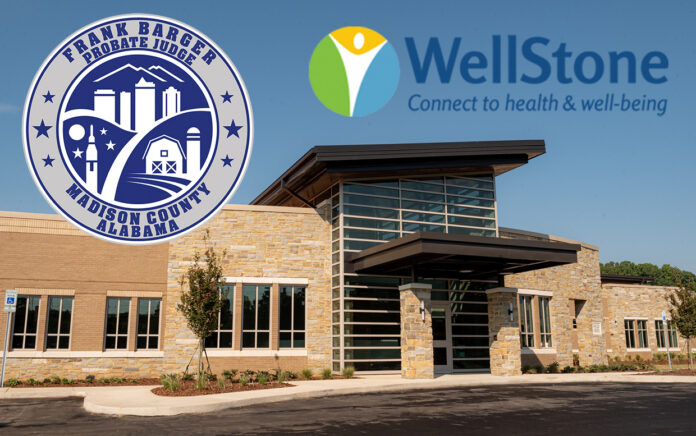HUNTSVILLE — Once again, Huntsville’s collaborative partnerships and focused teamwork have led to the success of a new initiative, this one related to mental health.
The Assisted Outpatient Treatments program is a partnership between WellStone and the Madison County Probate Office under Judge Frank Barger.
The program seeks to decrease the recidivism rate among people committed through the courts with mental health and behavioral problems. When appropriate, it is an effective alternative to certain levels of inpatient care, and a more productive means for outpatient care. It has stipulations designed to help people with mental health issues manage their illness so they can carry on a productive life.
“Folks within the system that come to me with involuntary commitment petitions have usually alienated any support system they have generally, so the recidivism rate among them is very high,” Barger said. “There is also a continuum of care issue. They are stabilized, a treatment plan is developed, and they are sent on their way.”
“In AOT, the person sees me once a month for five months (roughly 150 days). During that time, we pair them with a case manager, we make sure they are seeing a doctor, a therapist and taking their medications. We do home visits and try to accommodate any other needs they have during that time.”
AOT educates the patient and plugs them and their support group into the numerous community resources available. This helps them manage the care they need without assistance.
Several years before Barger took the bench in 2019, Wellstone’s Jeremy Blair presented the program to him.
“AOT is important to me because on a personal level, I have seen mental health issues get swept under the rug because of the stigma attached,” said Blair. “And it is very destructive to a family. If you compare showing up in an ER with a problem related to your diabetes or a mental health issue, there is really no difference.”
Barger made AOT a priority when he took over from his predecessor and he and Blair “bootstrapped” the new program because it is expensive to implement. It requires case managers, and being a new program with no track record, funding was hard to come by.
But Barger was committed. He has funded two new case managers, one focused on the patient, the other focused on the family or support system, using stockpiled $35 application fees his department collects for every passport application they process.
Barger puts 100% of it into AOT.
In terms of results, it takes several years of data to measure outcomes, but Barger has some positive anecdotal data based on the past three years.
“Recidivism among people who have completed AOT, is less than 20%,” said Barger. “If we get them in and provide the support and continuum of care, we tend not to see them again.
“Our petition numbers are higher than they were three years ago, but the amazing thing is, recidivism hasn’t increased, in fact, it has decreased over 2018 and 2019 when the program started.”
Barger admits Huntsville’s population growth has also likely skewed the numbers a little, but positive results are still clear in the existing data.
“Repeat cases in 2021 were 86 out of 414 petitions,” Barger said. “In 2019, it was 142 out of 309. It was even lower last year.”
Another boost to the AOT program is that Wellstone, on behalf of AOT, received a SAMHSA grant in December, good for four years at nearly $900,000 a year.
“We like four-year grants because by 2026 we will be able to gather enough data to show the impact of that program,” said Blair.
The grant will fund more case managers and therapists and case managers are important to the program, Blair said.
“They offer a wraparound service that helps patients do anything from obtaining health insurance and arranging transportation, to ensuring a stable living environment and helping them find a job or affordable housing,” he said. “We try to set goals for them, and we ask them outright, ‘What do you want to accomplish?’
“Most of them want to get better, they want a different life than the one they have.”
Barger made it clear, “We couldn’t implement AOT without Wellstone or make AOT work without Jeremy’s team,” he said.
How does AOT help?
Once a physician makes a recommendation, AOT focuses on the people recommended for inpatient care. Once they stabilize, they rarely need it any longer. Instead, they need continued care, making them the perfect candidate for AOT.
Barger is enthusiastic about the importance of the Legislature passing HB70 last March. Barger and Blair worked closely with State Rep. Rex Reynolds (R-Huntsville) to pass the bill focused on committing a person for mental health reasons.
Prior to HB70 passing and being enacted, Barger said they couldn’t change the treatment path for someone suffering with an illness.
“If I committed them, once they were turned over to the Department of Mental Health, I sign an order that I lose any jurisdiction,” said Barger. “With HB70 passed, we can convert inpatients to outpatients once they have been stabilized, on their medications and getting appropriate treatment.”
Blair said HB70 also better defines “clear and present danger.”
“If somebody needs to go to an emergency room for an evaluation, a probate judge can step in with a program like AOT in place,” Blair said.
AOT is used in a few states, but Huntsville’s AOT program is based specifically on a successful program in Texas.
Where else could a private nonprofit such as Wellstone initiate and fund a project alongside a sitting probate judge?
The Rocket City, of course, where we always reach for the moon.
Don’t miss out! Subscribe to our email newsletter to have all our smart stories delivered to your inbox.



